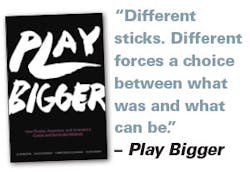Think different. Apple’s Steve Jobs drummed that message into consumers for many years and it was core to the company’s identity and its meteoric growth. Apple was not the bland world of beige desktop PCs (think Microsoft). It was about color and cool, about providing elegantly designed devices that worked seamlessly within a product and service ecosystem (think iPhone and iTunes).
In Play Bigger: How Pirates, Dreamers and Innovators Create and Dominate Markets (Harper Business, 2016, 256 pages, $28.99), Silicon Valley veterans Al Ramadan, Dave Peterson and Christopher Lochhead, along with business journalist Kevin Maney, make the case that business leaders who want to create a powerful, lasting company (or new division of an existing firm) should focus not simply on creating a better product but on creating a product category in which their new product and company will dominate.
Why is this so important? The difference between establishing a category and following can be staggering. Research by the authors shows that companies that define and dominate a category take about 75% of the profits and market value. The advantage is so lucrative that venture capitalists are beginning to tailor their investment decisions to focus on identifying such companies.
The internet is a powerful stimulus to this process. In a connected world, where information is available to people instantaneously, there is an increasing tendency to pick the leader in a category rather than choose second-best.
What is a category king? The authors call the companies that define, develop and dominate a market area “category kings.”
“Once people have chosen a king, they will always tend to believe the king is better, even if it’s not,” they write. “This reality explains why companies with superior technology can still lose category wars. Once a king emerges customers believe it’s the best, regardless of any evidence to the contrary.”
Learn More About the IndustryWeek Leadership Insights weekly newsletter
We are familiar with many of the business leaders who have created category kings in recent decades – Steve Jobs at Apple, Marc Benioff at Salesforce.com and Elon Musk at Tesla. But this phenomenon is not new. Consider Clarence Birdseye and his development of the frozen food industry.
Birdseye was a naturalist for the U.S. government, Play Bigger explains, when he went to Alaska and saw the Inuit people catch fish and throw them on the ice to freeze and preserve them. Birdseye returned home, experimented with using dry ice to freeze fish and then vegetables, and soon started a company. But as Play Bigger notes, simply creating the frozen food process was not enough. He had to get his product to consumers, and that led him to develop freezer cars for railroads and freezer cases for grocery stores. He also promoted frozen food as different from, not just better than, canned foods.
How do you create a category king? Plenty of companies with great product ideas fail. That is why the authors stress the value of category design, which they define as “the discipline of designing the space around your company and product, and changing people’s minds so they understand your product or service and demand it.” Category design isn’t for the faint of heart. Following this process requires demanding analysis and rigorous execution, but as the authors put it, “if we’re in an era when the category king wins big and everyone else goes home why wouldn’t you do everything you can to boost your odds?”
About the Author
Steve Minter
Steve Minter, Executive Editor
Focus: Leadership, Global Economy, Energy
Call: 216-931-9281
Follow on Twitter: @SgMinterIW
An award-winning editor, Executive Editor Steve Minter covers leadership, global economic and trade issues and energy, tackling subject matter ranging from CEO profiles and leadership theories to economic trends and energy policy. As well, he supervises content development for editorial products including the magazine, IndustryWeek.com, research and information products, and conferences.
Before joining the IW staff, Steve was publisher and editorial director of Penton Media’s EHS Today, where he was instrumental in the development of the Champions of Safety and America’s Safest Companies recognition programs.
Steve received his B.A. in English from Oberlin College. He is married and has two adult children.

